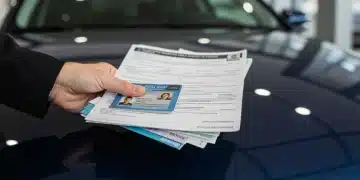Buying a Car Out of State in 2025: Tax & Registration Guide

Buying a car out of state in 2025 involves navigating varying registration and tax laws, including understanding temporary permits, state-specific sales taxes, and potential credit for taxes paid in another state, to ensure a smooth purchase and compliance.
Buying a car out of state in 2025: Understanding registration and tax implications can seem complex, but with the right information, you can navigate the process smoothly. This guide provides a clear overview of what to expect when purchasing a vehicle from another state and bringing it home.
Understanding the Basics of Out-of-State Car Purchases
Buying a car from a different state is a common practice, especially when seeking a better deal or a specific model. However, it’s crucial to understand the implications of such a purchase, including registration and taxes.
Why Buy Out of State?
Many buyers opt to purchase vehicles out of state for a variety of reasons, primarily driven by cost savings and wider selection.
- Lower Prices: Dealers in some states may offer lower prices due to lower taxes or inventory-clearing sales.
- Wider Selection: Finding a specific make, model, or trim level might be easier in another state.
- Specialized Vehicles: Some states have dealerships specializing in certain types of vehicles, like electric cars or luxury models.
Initial Steps Before Buying
Before committing to an out-of-state purchase, careful planning is essential to avoid potential pitfalls. Research and preparation are key.
- Research State Laws: Understand the vehicle registration and tax laws of both the state where you’re buying and your home state.
- Check Vehicle History: Ensure the vehicle has a clean title and no hidden issues by obtaining a vehicle history report.
- Inspect the Vehicle: If possible, inspect the car in person or hire a qualified mechanic to do so before making a purchase.

Purchasing a vehicle from out of state can lead to significant benefits, but it requires careful preparation and knowledge of relevant laws. Understanding these basics sets the stage for a smoother transaction and registration process.
Navigating Registration Requirements
Registering a vehicle purchased out of state involves specific procedures that can vary depending on where you live. Knowing the requirements beforehand can save time and avoid penalties.
Temporary Permits
Obtaining a temporary permit is often necessary to legally drive the vehicle from the seller’s location to your home state.
- Purpose: A temporary permit allows you to transport the vehicle legally before you can complete the full registration in your home state.
- How to Obtain: Typically, the dealership or seller will provide a temporary permit. Ensure it is valid and covers the duration of your trip.
- Requirements: You may need to provide proof of insurance and purchase agreement to obtain a temporary permit.
Home State Registration
Registering the vehicle in your home state requires specific documents and adherence to local regulations.
- Required Documents: Expect to need the original title, bill of sale, proof of insurance, and identification.
- Vehicle Inspection: Some states require a vehicle inspection to verify its condition and compliance with local regulations.
- Emissions Testing: Depending on your state, you may need to undergo emissions testing to ensure the vehicle meets environmental standards.
Verification of VIN
Verifying the Vehicle Identification Number (VIN) is a crucial step to confirm the vehicle’s identity and history.
VIN verification ensures that the vehicle matches the documentation and that there are no discrepancies that could indicate fraud or theft.
Contact your local Department of Motor Vehicles (DMV) to understand their VIN verification process, which may involve a physical inspection of the vehicle.
Understanding and fulfilling these registration requirements ensures that you can legally operate your newly purchased vehicle in your home state. Following the specific procedures and providing the necessary documentation will help you avoid potential fines or legal issues.
Understanding Sales Tax Implications
Sales tax is a significant consideration when buying a car out of state. The rules can be complex, but understanding them is essential for accurate budgeting.
Where Do You Pay Sales Tax?
Determining where sales tax is due depends on the specific circumstances of the purchase.
Generally, you will pay sales tax in the state where you register the vehicle, not necessarily where you buy it.
Some states have reciprocity agreements, allowing credit for taxes paid in another state, which can reduce your overall tax burden.
Calculating Sales Tax
Calculating the exact sales tax amount requires knowing the applicable tax rates and any applicable deductions.
- Tax Rate: Find out the sales tax rate in your home state.
- Taxable Amount: Determine the taxable amount, which is typically the vehicle’s purchase price minus any trade-in value or applicable discounts.
- Sales Tax Due: Multiply the taxable amount by the sales tax rate to calculate the total sales tax due.
Potential Credits for Taxes Paid
Many states offer credits for sales tax paid in another state to avoid double taxation.
To claim a credit, you typically need to provide proof of the taxes paid to the out-of-state dealer.
Consult with your local DMV or a tax professional to understand the specific rules regarding tax credits in your state.

A clear understanding of sales tax implications is crucial when buying a car out of state. Knowing where and how to pay taxes, as well as potential credits, ensures you avoid unexpected costs and comply with state laws.
Inspecting the Vehicle Before Purchase
Before finalizing the purchase of a vehicle from out of state, a thorough inspection is crucial to ensure its condition and avoid future problems.
Importance of Pre-Purchase Inspection
Inspecting the vehicle can reveal potential issues that might not be immediately apparent.
A pre-purchase inspection helps identify mechanical problems, body damage, or other issues that could affect the vehicle’s value and reliability.
It gives you leverage to negotiate the price or request repairs before committing to the purchase.
Hiring a Qualified Mechanic
Engaging a qualified mechanic to inspect the vehicle is a worthwhile investment.
- Expert Assessment: A mechanic can provide a comprehensive evaluation of the vehicle’s mechanical and structural condition.
- Detailed Report: A detailed inspection report can highlight any existing or potential problems.
- Negotiation Tool: Use the inspection report to negotiate repairs or a price reduction with the seller.
What to Look for During the Inspection
During the inspection, focus on key areas to assess the vehicle’s overall condition.
Check the engine, transmission, brakes, suspension, and other mechanical components for signs of wear or damage.
Examine the body for rust, dents, and evidence of prior accidents or repairs.
A comprehensive vehicle inspection is a critical step in the out-of-state car buying process. By being diligent and thorough, you can make an informed decision and avoid purchasing a vehicle with significant undisclosed issues.
Financing an Out-of-State Car Purchase
Financing a car purchased from another state involves considerations that differ slightly from local transactions. Understanding these differences can help you secure the best financing terms.
Working with Your Bank or Credit Union
Consulting with your local bank or credit union can simplify the financing process.
- Pre-Approval: Obtain pre-approval for a car loan to understand your budget and financing options.
- Rate Comparison: Compare the rates and terms offered by your bank or credit union with those available at the dealership.
- Lien Placement: Your bank or credit union can assist with placing a lien on the vehicle in your home state.
Out-of-State Dealership Financing
Many dealerships offer financing options for out-of-state buyers, which can streamline the purchase process.
Dealerships often partner with multiple lenders, providing a range of financing options to suit various credit profiles.
Be sure to carefully review the terms and conditions of any financing offered by the dealership to ensure it aligns with your financial goals.
Securing the Best Loan Terms
To secure the best loan terms, it’s essential to do your research and compare multiple offers.
- Shop Around: Obtain quotes from multiple lenders, including banks, credit unions, and dealerships.
- Negotiate: Negotiate the loan terms, including the interest rate, loan term, and any associated fees.
- Review Carefully: Carefully review all loan documents before signing to understand your obligations.
Financing an out-of-state car purchase requires careful planning and comparison. By working with your bank, exploring dealership financing, and shopping around for the best loan terms, you can secure a financing solution that meets your needs and budget.
Potential Challenges and How to Avoid Them
While buying a car out of state can offer advantages, it also presents potential challenges. Being aware of these issues can help you avoid them.
Title Issues and Delays
Title issues can arise when buying a car out of state, potentially delaying the registration process.
Ensure the seller has a clear title to the vehicle and that there are no liens or encumbrances.
Verify the accuracy of all information on the title and compare it to the vehicle’s documentation.
Work closely with the seller and your local DMV to resolve any title issues promptly.
Warranty Concerns
Understand the warranty coverage for the vehicle, especially if it’s a used car.
- Transferability: Confirm that the warranty is transferable to you as the new owner.
- Coverage Area: Check if the warranty coverage is valid in your home state.
- Service Availability: Ensure that authorized service centers are available in your area for warranty repairs.
Compliance with Local Regulations
Ensure the vehicle complies with all local regulations in your home state.
- Emissions Standards: Confirm that the vehicle meets your state’s emissions standards.
- Safety Standards: Verify that the vehicle meets all safety standards required in your state.
- Inspection Requirements: Be prepared to undergo any required vehicle inspections.
Addressing these potential challenges is crucial for a smooth out-of-state car buying experience. By doing your research and being proactive, you can minimize the risk of complications and ensure a successful purchase.
| Key Point | Brief Description |
|---|---|
| 🚗 Out-of-State Purchase | Buying from another state offers potential savings and more selection. |
| 📝 Registration | Register in your home state with required documents like title and insurance. |
| 💰 Sales Tax | Pay sales tax where you register, potentially getting credit for taxes paid elsewhere. |
| 🛠️ Pre-Purchase Inspection | Inspect the vehicle thoroughly to avoid hidden issues. |
Frequently Asked Questions
Buying a Car Out of State in 2025: Understanding Registration and Tax Implications
▼
You must register the vehicle in your home state. Contact your local Department of Motor Vehicles (DMV) for specific requirements.
▼
Not typically. Most states offer a credit for sales tax paid in another state, preventing double taxation. Check your state’s rules.
▼
You’ll generally need the original title, bill of sale, proof of insurance, and your driver’s license. Some states may require additional documents.
▼
Yes, a temporary permit allows you to legally drive the car from the seller’s location to your home state before full registration.
▼
Shop around for quotes from banks, credit unions, and dealerships to compare rates. Negotiate loan terms before finalizing your loan.
Conclusion
Buying a car out of state in 2025 can be a rewarding experience if you take the time to understand and navigate the various registration and tax implications. By following the guidelines outlined in this article, you can ensure a smooth and compliant purchase, setting you up for years of enjoyable driving.





